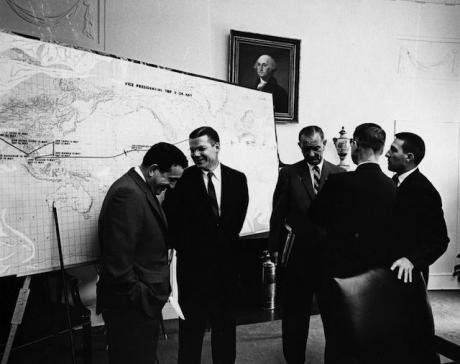
MIT’s Jerome Wiesner, Defense Secretary Robert McNamara and Vice-President Lyndon Johnson in the White House, 1961.JFK Library. All rights reserved.Whenever I need to understand the latest turn in US foreign policy, the first person I turn to is Noam Chomsky. His ability to cut through the fake news and highlight the real issues is simply unparalleled.
Chomsky’s political radicalism goes back to his early teenage years, but some later experience must explain why he chose to devote so much of his adult life to anti-militarist activism. I suspect an unusually intimate encounter with the US military during the early part of his career. After all, it is no secret that Chomsky’s linguistic work at the Massachusetts Institute of Technology was initially funded by the Pentagon. As he himself explains: ‘I was in a military lab. If you take a look at my early publications, they all say something about Air Force, Navy, and so on, because I was in a military lab, the Research Lab for Electronics.’
Chomsky has always been adamant that military funding had no effect on his work. Asked in 2016 if the military hoped to make use of his research, he replied: ‘That’s actually a widespread illusion. … It’s very widely believed but basically the military didn’t care what you were doing.’ The government, according to Chomsky, used the military ‘as a kind of a funnel by which tax-payer money was being used to create the hi-tech economy of the future.’ Chomsky cited the early development of the Internet, saying of the scientists who worked for the Advanced Research Projects Agency (ARPA) during the 1960s: ‘the military funded them but nobody had any military purpose.’
While no one can deny that defence spending played a crucial role in the development of today’s hi-tech economy, the Pentagon’s motives were always essentially military. Stephen Lukasik, the director of ARPA, was quite clear that his agency funded the research that led to the Internet in order ‘to meet the needs of military command and control against nuclear threats.’ Although most of the scientists who invented the Internet had no interest in military applications, Lukasik insists that ARPA’s sole purpose ‘was the command and control of military forces.’
The military were no less forthright in explaining why they funded Chomsky’s linguistics research. In 1971, having described how the Air Force needed to enhance its systems of computerised command and control, Colonel Edmund Gaines explained:
Defense of the continental United States against air and missile attack is possible in part because of the use of such computer systems. And of course, such systems support our forces in Vietnam. … Command and control systems would be easier to use [if artificial computer languages] were not necessary. We sponsored linguistic research in order to learn how to build command and control systems that could understand English queries directly.
This explanation is confirmed by a 1965 article written by Air Force Lieutenant Jay Keyser. In it, he suggested that the control languages then being used in the military’s command and control systems should be replaced with an English control language based on Chomsky’s insights into language structure. Keyser illustrated his article with words such as ‘aircraft’ and ‘missile’ as well as with sample sentences such as: ‘The bomber the fighter attacked landed safely.’
Much of this military linguistics work was done at an offshoot of MIT called the MITRE Corporation. As a 1968 article pointed out:
The most ambitious effort to construct an operating grammar is being made by a group at MITRE, concerned with English-like communication in command and control computer systems. It is no accident that Noam Chomsky, the major theorist in all of American linguistics, is located at MIT.
As many as ten MIT linguists worked on this MITRE project and a number of them have recently been in contact with me. They recall that between 1963 and 1965, Chomsky actually worked as a consultant on this Air Force sponsored project at MITRE. According to Chomsky’s students, the military justification for funding this work was ‘that in the event of a nuclear war, the generals would be underground with some computers trying to manage things, and that it would probably be easier to teach computers to understand English than to teach the generals to program.’ ‘it would probably be easier to teach computers to understand English than to teach the generals to program.’
To understand all this, it helps to know more about both the MITRE Corporation and MIT. MITRE was set up jointly by MIT and the US Air Force in order to develop air defence and ‘command and control’ technology for use in a nuclear war and in more limited conflicts like that in Vietnam. In its section on the Vietnam War, the Corporation’s official history states that, by 1967, ‘MITRE was devoting almost one-quarter of its total resources to the command, control, and communications systems necessary to the conduct of that conflict.’
This official history also refers to MITRE’s key role in creating the so-called McNamara line – a huge barrier of sensors, mines and cluster bombs along the border between North and South Vietnam. It is interesting to note here that it was ARPA who sponsored this project, a project that not only led to the deaths of thousands of Vietnamese but also, as Lukasik confirms, to today’s hi-tech military systems based on ‘smart weapons’ and ‘internetting’.
It was Jerome Wiesner who helped initiate this ground-breaking project. Wiesner matters to my story because he was the lab director who first recruited Chomsky to MIT in 1955, who co-founded MIT’s linguistics program in 1961 and who, as MIT’s Provost and then President, was in effect Chomsky’s boss for over 20 years.
By the early 1960s, Wiesner had become America’s most powerful military scientist, proud of the fact that his Research Laboratory of Electronics had made ‘major scientific and technical contributions to the continuing and growing military technology of the United States.’
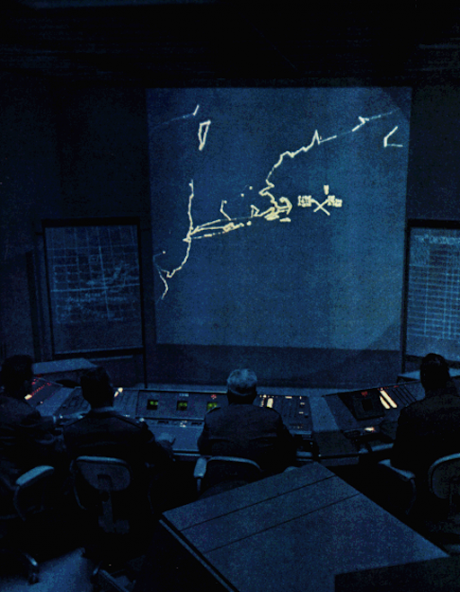
The SAGE air defense system control room. In the 1960s, the Pentagon sponsored linguists in the hope of making such computer systems easier to use. Wikicommons/public domain.He was also proud that he had ‘helped get the United States ballistic missile program established in the face of strong opposition from the civilian and military leaders of the Air Force and Department of Defense.’ As President Kennedy’s chief science advisor, Wiesner insisted that nuclear missile development and procurement ‘must all be accelerated’. As MIT’s Provost, he also oversaw research into helicopters, radar, smart bombs and counter-insurgency for the ongoing war in Vietnam.
The anarchy of science
Some of MIT’s military research was done by people who were quite happy to manufacture weaponry. But most academics prefer to think of themselves as free agents, unrestrained by military discipline. Wiesner clearly understood this when he advocated protecting ‘the anarchy of science’ in order to foster the emergence of novel insights. This approach was consistent with General Eisenhower’s 1946 directive that military scientists ‘must be given the greatest possible freedom to carry out their research.’ ‘[Wiesner] advocated protecting ‘the anarchy of science’ in order to foster the emergence of novel insights.’
The illusion of freedom was strengthened by the fact that, in order to secure funding from the Pentagon, MIT’s scientists would themselves come up with reasons why their research had military applications. Some scientists, no doubt, then convinced themselves that they were tricking the Pentagon into investing in research of real value to humanity. Yet precisely who was tricking who remains an open question. As long as a reasonable percentage of the research sponsored by the Pentagon turned out to be militarily useful, why should the Pentagon care what their scientists thought they were doing?
Professor Jonathan King revealed the level of self-delusion of many MIT researchers in the 1980s when he said:
There were hundreds and hundreds of physics and engineering graduate students working on these weapons. [They’d say things like] they’re working on the hydrodynamics of an elongated object passing through a deloop fluid at high speed. ‘Well, Isn’t that a missile?’ – ‘No, I’m just working on the basic principle; nobody works on weapons.’
The linguistics students who worked at MITRE in the 1960s seem to have had similar attitudes. One of them, Haj Ross, told me:
We were as free as birds. … I never had any whiff of military work at MITRE. … What we talked about had nothing at all to do with command and control or Air Force or anything similar.
Barbara Partee, also emphasised how free they were, although she was rather clearer about the Air Force’s requirements:
We had total freedom. Everybody could choose their own topic, as long as it could be related to the goal of eventually getting machines to process English sentences and do some question-answering on topics of potential interest to the Air Force.
It was Partee who told me that the justification for this research was that it would ‘be easier to teach computers to understand English than to teach the generals to program.’ When I asked her again how she felt about working on what was evidently a military project, she said that the ‘story of the generals being underground during the war and the computers therefore needing to understand English, really I’m not sure that anybody believed it.’ Partee also recalled that ‘we all tried to convince ourselves that taking Air Force money for such purposes was consistent with our consciences.’ She explained to me that ‘our standard rationalization was that it was better for defense spending to be diverted to linguistic research than to be used for really military purposes.’ ‘our standard rationalization was that it was better for defense spending to be diverted to linguistic research than to be used for really military purposes.’
Clearly, Partee still has some doubts about this rationalization, perhaps rightly. After all, in 1971, the Pentagon’s representatives insisted that the Defense Department funds ‘only research projects directly relevant to the military’s technological needs.’ And, when exhaustively checked at the time by a group of anti-militarist academics, this claim was found to be accurate.
The authors of the MITRE papers that name Chomsky as a ‘consultant’ are quite clear that their linguistics project was to develop ‘a program to establish natural language as an operational language for command and control.’ As it happened, this project was a complete failure. In practice, nothing worked. But what if it had succeeded? Wouldn’t that have led to a situation in which whenever a US commander targeted a village in a counter-insurgency operation – or targeted an entire city during a nuclear war – they would be unleashing death and destruction thanks to linguistic theories inspired, initially, by Chomsky himself?
Whenever Chomsky talks about the relation of his linguistics to the military, he always insists that the military never had any influence on his work and that they did not ‘involve themselves in any way in what was going on.’ At MIT, according to his testimony, ‘you could do what you wanted … It must’ve been one of the most free universities in the world.’
Based on such comments, it is hard to know what Chomsky was really thinking during his time at MITRE. But we can make inferences from what he did after his time there. After 1965, he appears to have resolved never again to work on a military project, instead committing himself to tireless anti-militarist activism. Up until then, Chomsky had been relatively quiet about his political views. Partee recalls: ‘I never heard him say a political word in any linguistics class,’ while Ross told me: ‘At MITRE I had never had the slightest hint about Noam’s radicalism.’ But, as is well known, from 1965 Chomsky threw himself into passionate and effective resistance against the war in Vietnam.
It was around this time, according to Chomsky, that he gave considerable thought to ‘resigning from MIT, which is, more than any other university, associated with activities of the Department of “Defense.”’ But resignation was a difficult choice if only because MIT’s managers had been treating him particularly well, appointing him associate professor at the age of 29 and named professor at 37. As Chomsky says, the named professorship, ‘isolated me from the alumni and government pressures.’ This meant that instead of resigning, Chomsky’s choice was to launch himself as an outspoken anti-militarist activist even while remaining in one of the US’s most prestigious military labs.
From Daniel Ellsberg to Edward Snowden, the US establishment has produced many courageous whistleblowers. But unlike so many of these, Chomsky has managed to maintain his career, remaining close to the US military and scientific elite while consistently denouncing that very same elite. This has lent a unique insight and authority to his denunciations of US military interventions. Unfortunately, there have also been costs, most strikingly reflected in the ultimate failure of Chomsky’s revolution in linguistics.
Chomsky’s linguistics
From the beginning of his career at MIT, Chomsky always preferred concepts of language so abstract and formal that linguistics came to resemble mathematics. Other linguists would tinker with his latest theory to make it more realistic. That is what his students were doing on that MITRE project. Chomsky went along with this for a while, but then resolved to retreat back into pure abstraction. His preferred choice was always to treat language as something so utterly abstract and other-worldly – so completely removed from any practical application – that no matter what insights he came up with, nothing could possibly be used to kill anyone. ‘no matter what insights he came up with, nothing could possibly be used to kill anyone.’
This last suggestion is controversial. But I have come across no better way of explaining the peculiar features of Chomsky’s linguistics. Chomsky insists, for example, that human language is purely individual, not a system of social communication. He goes on to argue the concepts used in sentences – for example ‘book’ or ‘carburettor’ – are genetically determined, having been fixed in the genome since the emergence of Homo sapiens, millennia before real books or carburettors had even been invented. As I show in my recent book, Decoding Chomsky, I am far from alone in finding these ideas very strange.
For anyone in my own position as a lifelong activist, it feels risky to say things that can so easily be misunderstood. No part of my account can detract from Chomsky’s record as a tireless anti-militarist campaigner. Neither can it detract from his persistence in withstanding the institutional pressures that he must have endured at MIT. Had he resigned in disgust in the mid-1960s, when he was thinking of doing so, he might never have gained the platform he needed to signal his dissidence across the world. There are times when all of us have to make compromises, some more costly than others. My argument is that it was Chomsky’s linguistics rather than his activism that bore the brunt of those damaging pressures and costs.
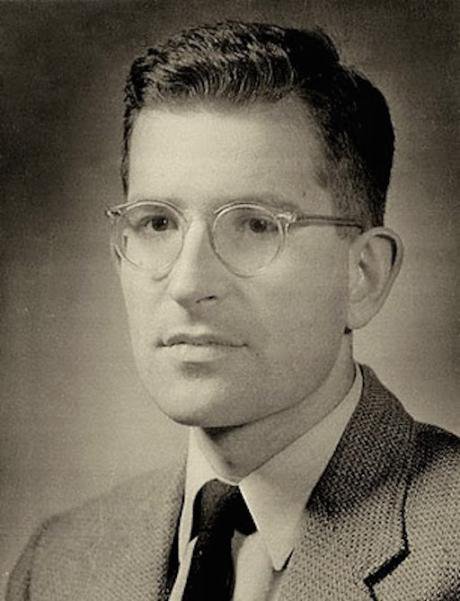
The young Noam Chomsky at MIT.
Read more
Get our weekly email
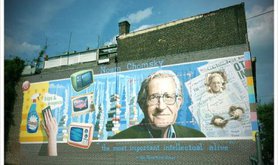

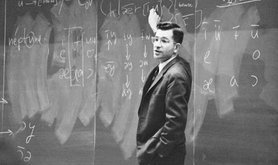

Comments
We encourage anyone to comment, please consult the oD commenting guidelines if you have any questions.